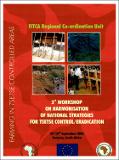3rd WORKSHOP ON HARMONISATION OF NATIONAL STRATEGIES FOR TSETSE CONTROL-ERADICATION.pdf

(en=English; ar=Arabic; fr=French; pt=Portuguese)
Authors
African Union Inter-African Bureau for Animal Resources
AU-IBAR
Item Usage Stats
144
views
views
61
downloads
downloads
Abstract
Animal resources are important in the economic development of African countries. Africa has
a wide variety of animal resources with an estimated livestock population of 224 million
cattle, 447 million sheep and goats and about 34 million equines and camels. With an annual
output value of US$13.3 billion of meat and US$5.3 billion of milk, livestock contribute
about 36% of Africa's agricultural gross domestic product.
Of: all the sub-regions of the world. Africa is the continent where production of livestock
products has the greatest potential to improve. It is also the continent where consumption is
growing at a faster rate than any other, spurred-on by a rapidly rising human population,
rising income levels and falling market prices of livestock products. In recent years domestic
production of livestock products has increased slowly, allowing the deficit between supply
and demand to increase. It is estimated that in Sahelian Africa where production of red meat
currently satisfies 56% of the total consumption, this will just cover 36% of the needs in
2020. The deficit will be imported, leading to an annual loss of US$1.5 billion in foreign
exchange on imports of meat and milk atone. It is estimated that the human population in sub
- Saharan Africa will be 1.3 billion by the year 2025 and that an estimated 19 million tons of
meat and 43 million tons of milk will be required annually to feed Africa's population.
Through the New Partnership for Africa's Development (NEPAD) initiative, African leaders
have recognized the importance of animal resources to the economic development of African
countries, and have committed themselves to the highest leve]s, to achieve sustainable
development in this sector. In support of the NEPAD initiative, African heads of state and
Government, meeting in Durban South Africa in July 2002, inscribed in the African Union
(AU) Constitutive Act among others, the objective to promote sustainable development at the
economic, social and cultural levels.....and to establish the necessary conditions which enable
the continent to play it's rightful role in the global economy and international negotiations.
Over the past 50 years, the Inter African Bureau for Animal Resources (IBAR) has been
working to develop the animal resources of Africa and stands at the forefront for the
implementation of the AU and NEPAD Initiatives.